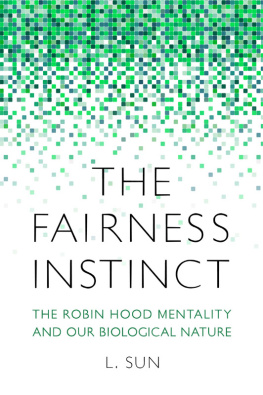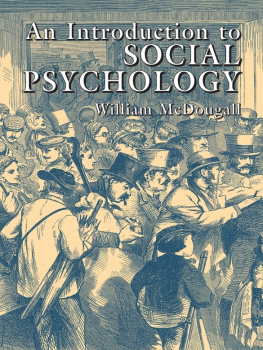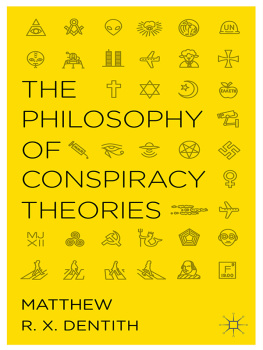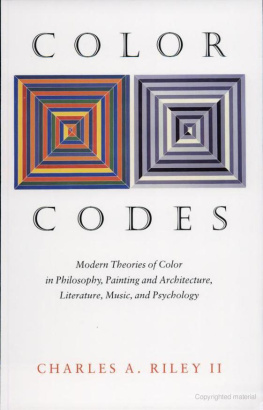THE SOCIAL PHILOSOPHY OF INSTINCT
CHARLES CONANT JOSEY

This 2011 edition published by Barnes & Noble, Inc.
All rights reserved. No part of this publication may be reproduced, stored in a retrieval system, or transmitted, in any form or by any means, electronic, mechanical, photocopying, recording, or otherwise, without prior written permission from the publisher.
Barnes & Noble, Inc.
122 Fifth Avenue
New York, NY 10011
ISBN: 978-1-4114-6282-3
CHAPTER I
INTRODUCTION
Conceptions of human nature and behavior have a profound influence on Social Philosophy. When the behavior of man is regarded as determined largely by the play of mechanical and impersonal forces Social Philosophy is quite different from what it is when the behavior of man is regarded as determined by the influence of ancestral spirits or by innate impulses longing for expression. Views regarding the source of human values also exert a profound influence on Social Philosophy. When the source of values is regarded as external to the individual, that is, when values are regarded as sentiments impressed on the individual by his group and culture, Social Philosophy is quite different from what it is when the source of values is regarded as internal. To an even greater extent do conceptions regarding the value of the individual influence Social Philosophy. For, obviously, the Social Philosophy that rests on the assumption that the individual is of value principally as a means to help achieve the ends of some transcendental power, say that of the State, is quite different from the Social Philosophy committed to the view that the State is of value only as a means to help realize the instinctive ends of the individual.
This is as it should be. It is good that conceptions of human nature are regarded as determining what is good for man. If human nature is not to determine what is good for man, what is? The relation pointed out between views of human nature and Social Philosophy is what we should wish. Writers, then, who seek to build their Social Philosophy on their conception of human nature follow the right method and are not to be criticised for this. Yet the writings of many of our Social Philosophers seem to indicate that they should be criticised for not exercising due care and criticism in reaching their conclusions regarding human nature. The writers to whom I refer are found for the most part among the group which may be called the biological sociologists.
Under the influence of evolutionary thought and the accompanying emphasis placed on genetics, many writers in this group have reached very definite conceptions regarding human nature and the motives which determine human behavior. In many circles it is assumed that, as a result of the evolution of the species, we possess certain inherited or innate forces in virtue of which we act and which largely determine how we act. Our behavior, according to this view, is determinednot by the give-and-take relations existing between us and our environmentbut by forces which we inherit as a result of the give-and-take relations our ancestors sustained to their environment.
Conceptions of this nature have deeply colored the
This conception of force in terms of which phenomena can be explained has disappeared from the physical sciences. That it should still persist in the biological and social sciences is not hard to understand. It is due to a great extent to the origin of our conception of force. Our notion of force is deeply rooted in overcoming obstacles. At such moments we feel ourselves animated by a great force, which is putting forth every effort to accomplish the desired end. Likewise in our moments of inspiration and enthusiasm we feel ourselves lifted up and ennobled by a power or force which holds us in its grasp. It is not unnatural that a notion thus acquired should be held fast as an explanation of the very experiences in which it was discovered. It is because we experience forces directly or immediately in our behavior that we wish or hope to interpret our behavior in terms of a force. It is for this reason that this old notion of force, though abandoned in physics, continues to play an important part in our explanation of social and organic behavior.
The explanation of the abandonment of this use of force in the physical sciences will make clear another reason for its persistence in the biological sciences. It is not hard to understand why it should have been abandoned in the physical sciences; for there we can calculate forces exactly and balance one against the other. As soon as we are able to do this, we begin to treat them as functions of the situations in which they appear, rather than as forces independent of the situation and in terms of which the situation can be explained. Forces thus come to be regarded as results of the situation, and hence cannot be used to account for the situation or activity in which they appear. This is not so easily done in the biological sciences. There the data are much more complex, and we find greater difficulty in viewing the forces as products of the situation in which they appear.
This difficulty, however, should not be allowed to mislead us. An illustration drawn from one of the purely physical sciences will make clear how we should regard all forces. For example, let us take the activity that is involved in the precipitation of a chemical from a solution. In an activity of this sort we feel no need of a "crystalline force" to bring about the precipitation or crystallization. Yet in this activity force is beyond doubt involved. But the force, like the activity, is quite naturally regarded as a function of the situation in which it appears, and no one thinks that it is to be regarded as a sort of agency in virtue of which the activity takes place. The phenomenon of crystallization or precipitation is consequent upon variations in the temperature of the solution, or upon some other change in the total situation. Hence, there is no need of a force to account for the activity. Given certain conditions, the chemical crystallizes, and any force that may be involved is merely an aspect of the phenomenon rather than an entity or power manifesting itself in the process of crystallization.
This seems very obvious when we are dealing with purely physical processes. Yet we find it difficult to view the forces manifested in the behavior of organisms is not regarded as satisfactory by many. Such explanations are held to be inadequate, since they do not tell us in virtue of what force the organism acts. This inadequacy is met by the simple device of positing in the organism various forces corresponding to the behavior observed. Thus the inadequacy is met, and the needs felt for a real explanation are satisfied.
Formerly physicists, in answer to similar metaphysical needs, were led to posit in a falling stone a force which impelled it to seek its proper place. Yet obviously the force manifested in the fall of the stone is a product of the situation, and cannot be used to account for the phenomenon. That is to say, given a stone placed in a certain position, it will fall, and with its fall force will be generated. It does not fall, however, because of the force. Rather there is force because it falls.
In the same way the forces experienced in the behavior of organisms should be regarded as due to the situations in which they appear. It must be recognized that many of our experiences seem to involve forces that exist independently of the situation in which they are felt. This, however, should not mislead us. For the apparent independence of these forces is due largely to our inability to correlate them sufficiently exactly with the known and variable elements in the situation, and to the fact that the same














